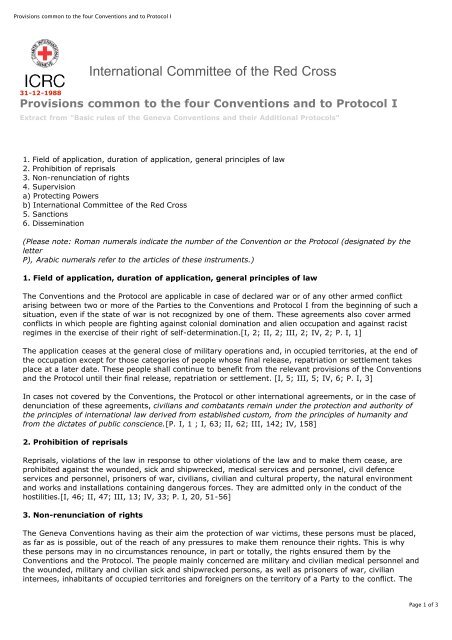The Law of War
The Law of War
The Law of War
Create successful ePaper yourself
Turn your PDF publications into a flip-book with our unique Google optimized e-Paper software.
Provisions common to the four Conventions and to Protocol I<br />
International Committee <strong>of</strong> the Red Cross<br />
31-12-1988<br />
Provisions common to the four Conventions and to Protocol I<br />
Extract from "Basic rules <strong>of</strong> the Geneva Conventions and their Additional Protocols"<br />
1. Field <strong>of</strong> application, duration <strong>of</strong> application, general principles <strong>of</strong> law<br />
2. Prohibition <strong>of</strong> reprisals<br />
3. Non-renunciation <strong>of</strong> rights<br />
4. Supervision<br />
a) Protecting Powers<br />
b) International Committee <strong>of</strong> the Red Cross<br />
5. Sanctions<br />
6. Dissemination<br />
(Please note: Roman numerals indicate the number <strong>of</strong> the Convention or the Protocol (designated by the<br />
letter<br />
P), Arabic numerals refer to the articles <strong>of</strong> these instruments.)<br />
1. Field <strong>of</strong> application, duration <strong>of</strong> application, general principles <strong>of</strong> law<br />
<strong>The</strong> Conventions and the Protocol are applicable in case <strong>of</strong> declared war or <strong>of</strong> any other armed conflict<br />
arising between two or more <strong>of</strong> the Parties to the Conventions and Protocol I from the beginning <strong>of</strong> such a<br />
situation, even if the state <strong>of</strong> war is not recognized by one <strong>of</strong> them. <strong>The</strong>se agreements also cover armed<br />
conflicts in which people are fighting against colonial domination and alien occupation and against racist<br />
regimes in the exercise <strong>of</strong> their right <strong>of</strong> self-determination.[I, 2; II, 2; III, 2; IV, 2; P. I, 1]<br />
<strong>The</strong> application ceases at the general close <strong>of</strong> military operations and, in occupied territories, at the end <strong>of</strong><br />
the occupation except for those categories <strong>of</strong> people whose final release, repatriation or settlement takes<br />
place at a later date. <strong>The</strong>se people shall continue to benefit from the relevant provisions <strong>of</strong> the Conventions<br />
and the Protocol until their final release, repatriation or settlement. [I, 5; III, 5; IV, 6; P. I, 3]<br />
In cases not covered by the Conventions, the Protocol or other international agreements, or in the case <strong>of</strong><br />
denunciation <strong>of</strong> these agreements, civilians and combatants remain under the protection and authority <strong>of</strong><br />
the principles <strong>of</strong> international law derived from established custom, from the principles <strong>of</strong> humanity and<br />
from the dictates <strong>of</strong> public conscience.[P. I, 1 ; I, 63; II, 62; III, 142; IV, 158]<br />
2. Prohibition <strong>of</strong> reprisals<br />
Reprisals, violations <strong>of</strong> the law in response to other violations <strong>of</strong> the law and to make them cease, are<br />
prohibited against the wounded, sick and shipwrecked, medical services and personnel, civil defence<br />
services and personnel, prisoners <strong>of</strong> war, civilians, civilian and cultural property, the natural environment<br />
and works and installations containing dangerous forces. <strong>The</strong>y are admitted only in the conduct <strong>of</strong> the<br />
hostilities.[I, 46; II, 47; III, 13; IV, 33; P. I, 20, 51-56]<br />
3. Non-renunciation <strong>of</strong> rights<br />
<strong>The</strong> Geneva Conventions having as their aim the protection <strong>of</strong> war victims, these persons must be placed,<br />
as far as is possible, out <strong>of</strong> the reach <strong>of</strong> any pressures to make them renounce their rights. This is why<br />
these persons may in no circumstances renounce, in part or totally, the rights ensured them by the<br />
Conventions and the Protocol. <strong>The</strong> people mainly concerned are military and civilian medical personnel and<br />
the wounded, military and civilian sick and shipwrecked persons, as well as prisoners <strong>of</strong> war, civilian<br />
internees, inhabitants <strong>of</strong> occupied territories and foreigners on the territory <strong>of</strong> a Party to the conflict. <strong>The</strong><br />
Page 1 <strong>of</strong> 3

















